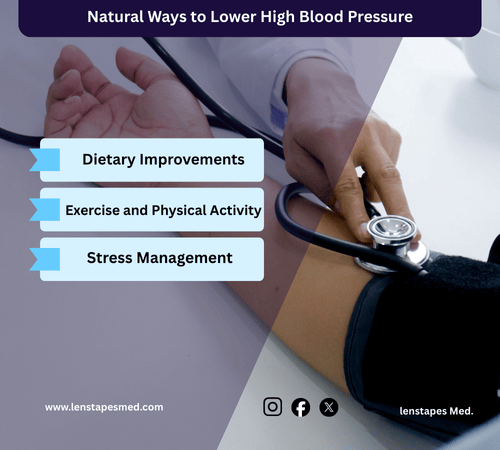One of the most common health issues in the world is high blood pressure. Because it can cause silent harm to your body for years before symptoms show up, it is frequently referred to as the silent killer. Although it affects millions of people, many are unaware that they have it. If high blood pressure is not managed, it can result in stroke, kidney failure, heart disease, and even death. Maintaining long-term health requires an understanding of the causes, risks, and available treatments.
The science behind high blood pressure, its hidden causes, including the possibility of infection, and how it can result in life-threatening consequences like heart attacks, will all be covered in this article. By the end, you’ll understand not only what causes it but also how to manage it before it causes irreparable harm.
What Is High Blood Pressure?
When the force of blood pressing against the arterial walls is continuously too great, it is referred to as high blood pressure. Systolic (the pressure during a heartbeat) and diastolic (the pressure during a resting heart) are the two numbers that represent blood pressure, which is measured in millimeters of mercury (mmHg). Generally speaking, normal blood pressure is less than 120/80 mmHg. High blood pressure is the diagnosis made when readings continuously increase to 130/80 mmHg or higher.
This illness increases the risk of heart attack, stroke, kidney disease, and other major complications by making the heart and arteries work harder.
What Causes High Blood Pressure?
High blood pressure is caused by a variety of factors, including genetic influences and lifestyle decisions. Preventing and controlling it requires an understanding of the causes.
Lifestyle Triggers
Daily routines are one of the primary sources of high blood pressure. Blood pressure can be considerably increased by eating a diet heavy in processed foods, salt, and bad fats. The cardiovascular system is weakened by inactivity, which causes the heart to work harder and be less effective. Smoking and binge drinking also harm blood vessels, which is a direct cause of high blood pressure.
Genetic and Family History
Genetics is another factor contributing to high blood pressure. Your risk is increased if your parents or other close family members have high blood pressure. Research indicates that your body’s ability to control blood pressure is strongly influenced by your genetic makeup.
Stress and Hormonal Factors
Prolonged spikes in hormones like cortisol and adrenaline brought on by chronic stress cause artery narrowing and an increase in heart rate. This ongoing stress can eventually lead to high blood pressure. Blood pressure is also impacted by hormonal conditions, such as thyroid imbalances or issues with the adrenal glands.
Does Infection Cause High Blood Pressure?
One frequently asked question is whether infection results in high blood pressure. According to research, because infections cause inflammation and stress on the body, they may momentarily raise blood pressure. For instance, respiratory or urinary tract infections may result in brief increases in blood pressure.
Infections can occasionally harm blood vessels as well, which can have long-term consequences. Increased cardiovascular risks have been associated with persistent infections, especially viral infections. Even though an infection by itself might not be the cause of high blood pressure, it can exacerbate pre-existing hypertension or make it more difficult to manage.
Can High Blood Pressure Cause a Heart Attack?
There is no denying the connection between high blood pressure and heart disease. However, a lot of people are curious if high blood pressure can lead to a heart attack. Yes, is the response.
The arteries narrow and stiffen as a result of the continuous stress caused by high blood pressure. This condition, called atherosclerosis, limits the heart’s ability to receive blood. A heart attack happens when a clot forms and blocks an artery. Indeed, high blood pressure is regarded as one of the leading risk factors for heart attacks globally.
Overworking the heart muscle until it weakens not only raises the risk of a heart attack but also plays a role in heart failure. Because of this, controlling high blood pressure is crucial to avoiding potentially fatal cardiac events. [3]
The Hidden Dangers of High Blood Pressure
The fact that high blood pressure is silent is among its most dangerous features. Most people don’t have any symptoms until there has been significant harm. Vision issues, kidney disease, and even dementia brought on by decreased blood flow to the brain are examples of hidden risks.
Uncontrolled high blood pressure over time can also cause the heart to enlarge and become less effective. Fatigue, dyspnoea, and ultimately heart failure result from this.

Natural Ways to Lower High Blood Pressure
Heavy medication is not always necessary to manage high blood pressure. Changes in lifestyle can have a big impact.
Dietary Improvements
One of the best strategies to reduce high blood pressure is to eat a diet high in fruits, vegetables, lean protein, and whole grains. Lower readings are directly impacted by consuming less salt. It is generally advised to follow the DASH diet (Dietary Approaches to Stop Hypertension) in order to naturally control high blood pressure.
Exercise and Physical Activity
Frequent exercise makes the heart stronger, which enables it to pump blood more effectively and with less force. Most days of the week, just 30 minutes of moderate exercise can significantly lower high blood pressure levels.
Stress Management
Deep breathing, yoga, and meditation can ease the tension in the cardiovascular system because stress is a major trigger. Effective stress management is a long-term approach to high blood pressure control.
Medical Treatments for High Blood Pressure
Medication is sometimes required when lifestyle modifications are insufficient. Depending on the patient’s condition, doctors may prescribe beta-blockers, calcium channel blockers, ACE inhibitors, or diuretics. These medications aid in controlling blood flow and high blood pressure.
It’s crucial to pay attention to and heed the doctor’s advice. Abruptly stopping medication can result in dangerous blood pressure spikes. [6]
Prevention Tips for High Blood Pressure
Prevention is the best way to deal with high blood pressure. Eating a balanced diet, reducing alcohol intake, stopping smoking, and maintaining a healthy weight are all effective strategies. Frequent examinations guarantee that blood pressure is tracked and, if necessary, treated promptly.
Sleep is also crucial. Since high blood pressure is closely associated with both poor sleep quality and sleep apnoea, getting enough sleep is crucial for heart health.
Conclusion
High blood pressure is a silent threat that, if disregarded, can ruin health; it is more than just a number on a monitor. The first step in prevention is to understand what causes high blood pressure, how infections may affect it, and how it can lead to heart attacks.
The risks of heart attack, kidney disease, and stroke can be significantly decreased, and high blood pressure can be managed with lifestyle modifications, medical attention, and routine monitoring. Being conscious and taking preventative measures now is the first step in safeguarding your health.
FAQ,s
1. What causes high blood pressure most commonly?
The most frequent causes are genetics, stress, obesity, poor diet, and inactivity.
2. Does infection cause high blood pressure permanently?
While infections can result in brief spikes, chronic lifestyle choices or genetic factors are typically the cause of permanent high blood pressure.
3. Can high blood pressure cause a heart attack in young people?
Indeed, even in young adults, high blood pressure can harm arteries and cause heart attacks if it is not managed.
4. How many times should I check my blood pressure?
Doctors recommend checking it at least once every 6 months if normal, and more frequently if diagnosed with high blood pressure.
5. Can stress alone cause high blood pressure?
Chronic stress can contribute significantly to high blood pressure, especially when combined with poor lifestyle habits.
References
Details
1. National Heart, Lung, and Blood Institute. High Blood Pressure: Causes and Risk Factors [Internet]. Bethesda (MD): NHLBI; 2023 [cited 2025 Sep 13]. Available from: https://www.nhlbi.nih.gov/health/high-blood-pressure/causes
2. Centers for Disease Control and Prevention. High Blood Pressure Facts & Statistics [Internet]. Atlanta (GA): CDC; 2023 [cited 2025 Sep 13]. Available from: https://www.cdc.gov/high-blood-pressure/data-research/facts-stats/index.html
3. Centers for Disease Control and Prevention. About High Blood Pressure [Internet]. Atlanta (GA): CDC; 2023 [cited 2025 Sep 13]. Available from: https://www.cdc.gov/high-blood-pressure/about/index.html
4. National Heart, Lung, and Blood Institute. High Blood Pressure Research [Internet]. Bethesda (MD): NHLBI; 2022 [cited 2025 Sep 13]. Available from: https://www.nhlbi.nih.gov/research/high-blood-pressure
5. Fuchs FD, Whelton PK. High blood pressure and cardiovascular disease. Hypertension. 2020;75(2):285-92. doi:10.1161/HYPERTENSIONAHA.119.14240. https://pubmed.ncbi.nlm.nih.gov/31865786/?utm_source=chatgpt.com
6. Centers for Disease Control and Prevention. Team-Based Care to Improve Blood Pressure Control [Internet]. Atlanta (GA): CDC; 2022 [cited 2025 Sep 13]. Available from: https://www.cdc.gov/high-blood-pressure/php/data-research/team-based-care/index.html
7. University of Alabama at Birmingham. Study confirms: controlling blood pressure is critically important in preventing heart disease and stroke [Internet]. Birmingham (AL): UAB; 2015 [cited 2025 Sep 13]. Available from: https://www.uab.edu/news/health-medicine/study-confirms-controlling-blood-pressure-is-critically-important-in-preventing-heart-disease-and-stroke
8. National Institute for Health and Care Research. Lowering blood pressure reduces the risk of heart disease, stroke, and death [Internet]. London (UK): NIHR; 2016 [cited 2025 Sep 13]. Available from: https://evidence.nihr.ac.uk/alert/lowering-blood-pressure-reduces-the-risk-of-heart-disease-stroke-and-death



